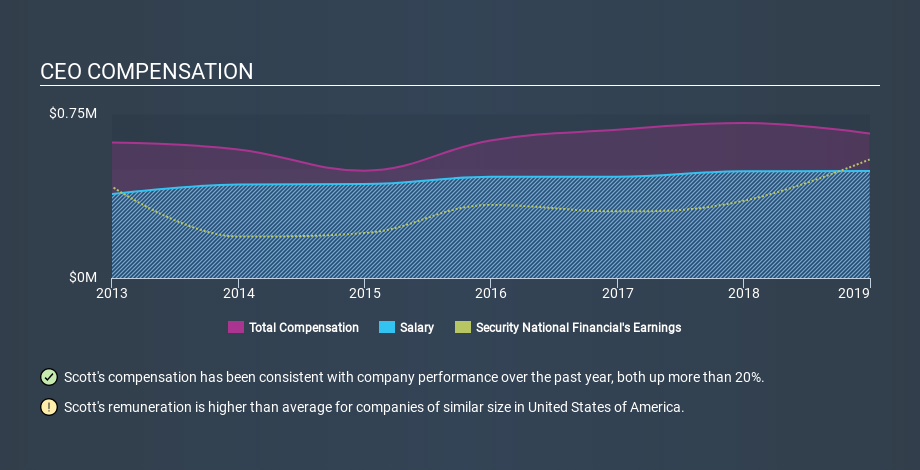- United States
- /
- Diversified Financial
- /
- NasdaqGM:SNFC.A
Is Security National Financial Corporation's (NASDAQ:SNFC.A) CEO Paid At A Competitive Rate?

In 2012 Scott Quist was appointed CEO of Security National Financial Corporation (NASDAQ:SNFC.A). This report will, first, examine the CEO compensation levels in comparison to CEO compensation at companies of similar size. After that, we will consider the growth in the business. And finally we will reflect on how common stockholders have fared in the last few years, as a secondary measure of performance. This process should give us an idea about how appropriately the CEO is paid.
See our latest analysis for Security National Financial
How Does Scott Quist's Compensation Compare With Similar Sized Companies?
According to our data, Security National Financial Corporation has a market capitalization of US$92m, and paid its CEO total annual compensation worth US$661k over the year to December 2018. While we always look at total compensation first, we note that the salary component is less, at US$489k. We examined a group of similar sized companies, with market capitalizations of below US$200m. The median CEO total compensation in that group is US$501k.
As you can see, Scott Quist is paid more than the median CEO pay at companies of a similar size, in the same market. However, this does not necessarily mean Security National Financial Corporation is paying too much. We can get a better idea of how generous the pay is by looking at the performance of the underlying business. Although we don't have analyst forecasts you might want to assess this data-rich visualization of earnings, revenue and cash flow.
The graphic below shows how CEO compensation at Security National Financial has changed from year to year.

Is Security National Financial Corporation Growing?
Security National Financial Corporation has increased its earnings per share (EPS) by an average of 1.6% a year, over the last three years (using a line of best fit). In the last year, its revenue is down 4.4%.
I would argue that the lack of revenue growth in the last year is less than ideal, but it is good to see EPS growth. These two metric are moving in different directions, so while it's hard to be confident judging performance, we think the stock is worth watching.
Has Security National Financial Corporation Been A Good Investment?
With a three year total loss of 14%, Security National Financial Corporation would certainly have some dissatisfied shareholders. So shareholders would probably think the company shouldn't be too generous with CEO compensation.
In Summary...
We compared the total CEO remuneration paid by Security National Financial Corporation, and compared it to remuneration at a group of similar sized companies. Our data suggests that it pays above the median CEO pay within that group.
While we have not been overly impressed by the business performance, the shareholder returns, over three years, have been disappointing. Shareholders may wish to consider further research. Although we don't think the CEO pay is too high, it is probably more on the generous side of things. CEO compensation is one thing, but it is also interesting to check if the CEO is buying or selling Security National Financial (free visualization of insider trades).
Arguably, business quality is much more important than CEO compensation levels. So check out this free list of interesting companies, that have HIGH return on equity and low debt.
If you spot an error that warrants correction, please contact the editor at editorial-team@simplywallst.com. This article by Simply Wall St is general in nature. It does not constitute a recommendation to buy or sell any stock, and does not take account of your objectives, or your financial situation. Simply Wall St has no position in the stocks mentioned.
We aim to bring you long-term focused research analysis driven by fundamental data. Note that our analysis may not factor in the latest price-sensitive company announcements or qualitative material. Thank you for reading.
About NasdaqGM:SNFC.A
Security National Financial
Engages in the life insurance, cemetery and mortuary, and mortgage businesses.
Excellent balance sheet with proven track record.
Market Insights
Community Narratives



